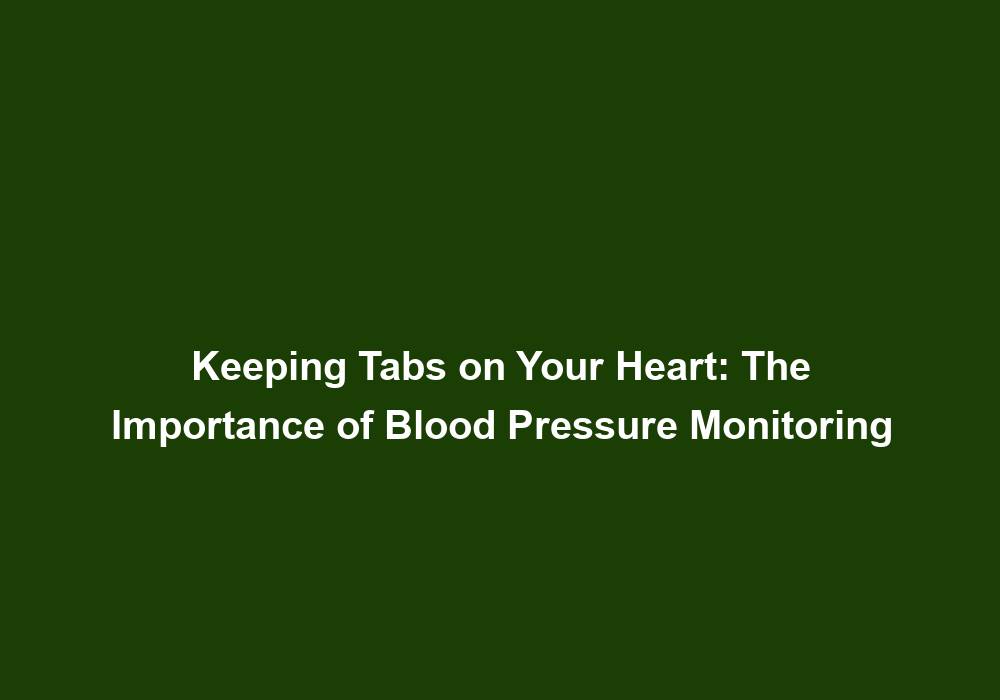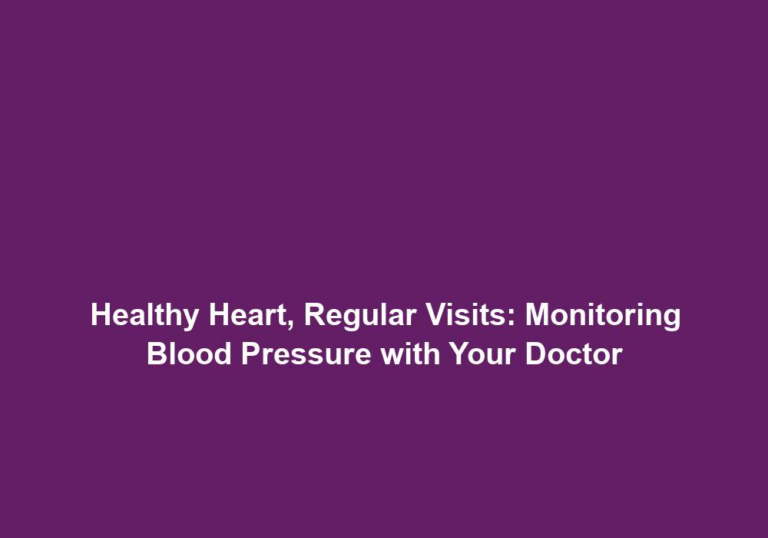Keeping Tabs on Your Heart: The Importance of Blood Pressure Monitoring
Monitoring your blood pressure is a crucial part of maintaining your overall health and well-being. By keeping tabs on your heart, you can effectively manage your blood pressure levels and reduce the risk of various cardiovascular diseases. In this article, we will delve into the significance of blood pressure monitoring and provide insights into its importance in maintaining a healthy lifestyle.
Understanding Blood Pressure
Blood pressure refers to the force exerted by your blood against the walls of your arteries as it flows through them. It is typically measured in millimeters of mercury (mmHg) and is represented by two numbers: systolic pressure over diastolic pressure. The systolic pressure represents the force exerted on the arterial walls when the heart contracts, while the diastolic pressure signifies the pressure in the arteries when the heart is at rest between beats.
Monitoring your blood pressure is important because it helps you understand the state of your cardiovascular health. By knowing your blood pressure readings, you can identify any potential issues and take necessary steps to address them. Here are some key reasons why keeping tabs on your blood pressure is crucial:
1. Early Detection of Hypertension
Hypertension, commonly known as high blood pressure, often shows no noticeable symptoms in its early stages. By regularly monitoring your blood pressure, you can catch any elevation in readings and take appropriate measures to address it promptly. Early detection of hypertension allows for better management, reducing the risk of heart attacks, strokes, and other cardiovascular diseases.
Regular blood pressure monitoring is especially important for individuals with a family history of hypertension or those at risk due to lifestyle factors such as poor diet, lack of exercise, or excessive stress. By monitoring your blood pressure, you can take preventive actions and make necessary lifestyle changes to keep your blood pressure within a healthy range.
2. Assessing the Effectiveness of Lifestyle Changes and Medications
If you have already been diagnosed with hypertension or are at risk, monitoring your blood pressure helps evaluate the effectiveness of lifestyle modifications and medications. By tracking your readings over time, you can determine whether the changes you have made, such as diet modifications, exercise routines, or medication adherence, have had a positive impact on your blood pressure levels.
Regular blood pressure monitoring provides valuable feedback on the effectiveness of your current treatment plan. It helps you and your healthcare provider assess whether modifications are needed to achieve optimal blood pressure control. By understanding the impact of lifestyle changes and medications on your blood pressure, you can make informed decisions about your treatment and take proactive steps towards better cardiovascular health.
3. Identifying White Coat Hypertension
Some individuals experience elevated blood pressure readings solely in a medical setting due to anxiety or stress, a condition known as white coat hypertension. Monitoring your blood pressure at home using a reliable blood pressure monitor can help differentiate between actual hypertension and temporary spikes caused by the medical environment. This clarification is crucial for accurate diagnosis and treatment decisions.
By monitoring your blood pressure in a comfortable and familiar environment, such as your home, you can obtain more accurate readings that reflect your true blood pressure status. This information is essential for your healthcare provider to make informed decisions about your treatment plan. Additionally, distinguishing between white coat hypertension and true hypertension can prevent unnecessary medication adjustments and reduce anxiety associated with medical visits.
4. Managing Chronic Conditions
Blood pressure monitoring is especially vital for individuals with chronic conditions such as diabetes or kidney disease. These conditions can significantly affect blood pressure levels and increase the risk of complications. By regularly monitoring blood pressure, individuals with chronic conditions can work with their healthcare providers to tailor their treatment plans and keep their blood pressure within a healthy range.
For individuals with chronic conditions, blood pressure management is crucial to prevent further health complications. Regular monitoring helps identify any fluctuations or trends in blood pressure levels, allowing for timely adjustments to medication or treatment plans. By actively managing their blood pressure, individuals with chronic conditions can improve their overall health outcomes and reduce the risk of cardiovascular events.
5. Preventing Heart Disease and Stroke
High blood pressure is a significant risk factor for heart disease and stroke. By monitoring your blood pressure, you can take proactive measures to lower it and reduce the risk of these life-threatening conditions. Lifestyle modifications, such as maintaining a healthy weight, consuming a balanced diet low in sodium, exercising regularly, and managing stress, can significantly contribute to maintaining optimal blood pressure levels and preventing cardiovascular diseases.
Regular blood pressure monitoring empowers individuals to make lifestyle choices that positively impact their cardiovascular health. By consistently monitoring blood pressure, individuals can track the effectiveness of their efforts in lowering blood pressure and reducing the risk of heart disease and stroke. This proactive approach to blood pressure management is essential for maintaining long-term cardiovascular health.
Tips for Blood Pressure Monitoring
To ensure accurate blood pressure monitoring, here are some helpful tips to keep in mind:
- Invest in a reliable blood pressure monitor for home use. Look for monitors that are validated and recommended by healthcare professionals.
- Follow the instructions provided with your monitor carefully. Each device may have specific guidelines for proper use and positioning.
- Measure your blood pressure at the same time each day. Consistency in timing helps establish a reliable baseline for tracking and comparing readings.
- Sit comfortably and ensure your arm is supported at heart level during the measurement. This position helps obtain accurate readings by minimizing interference from gravity.
- Avoid smoking, caffeine, and exercise for at least 30 minutes before monitoring. These activities can temporarily elevate blood pressure and affect the accuracy of readings.
- Take multiple readings and record the average for more accurate results. Blood pressure can fluctuate throughout the day, so taking multiple readings helps capture a more comprehensive picture of your blood pressure trends.
- Share your readings with your healthcare provider during regular check-ups. By providing your healthcare provider with updated blood pressure records, they can assess the effectiveness of your treatment plan and make any necessary adjustments.
By following these tips and regularly monitoring your blood pressure, you can play an active role in your cardiovascular health and make informed decisions about your lifestyle choices and treatment plans.
Conclusion
Keeping tabs on your heart through blood pressure monitoring is an essential aspect of maintaining good health. Early detection of hypertension, assessing the effectiveness of lifestyle changes and medications, and managing chronic conditions are just a few reasons why monitoring your blood pressure is crucial. By taking proactive measures to keep your blood pressure within a healthy range, you can significantly reduce the risk of heart disease, stroke, and other cardiovascular complications. Remember to consult with your healthcare provider for personalized guidance and recommendations regarding your blood pressure management.







